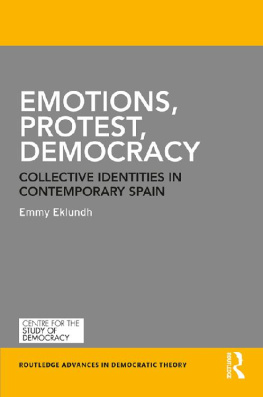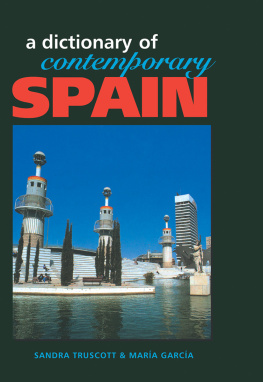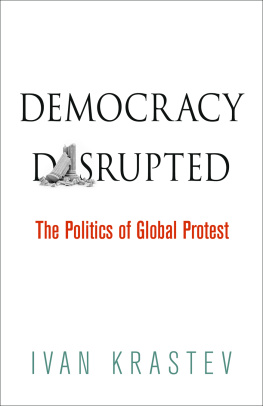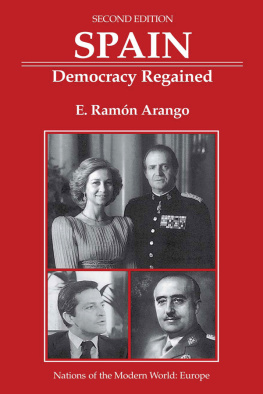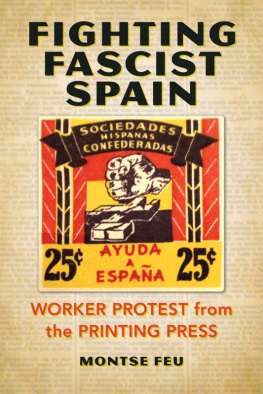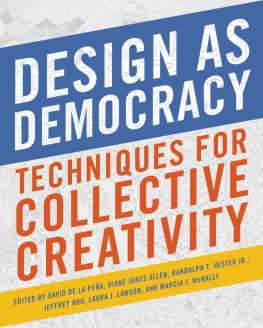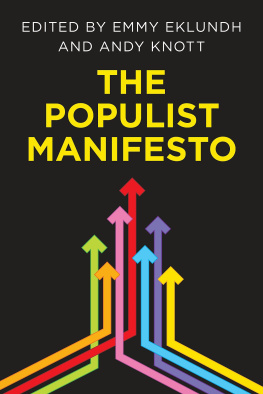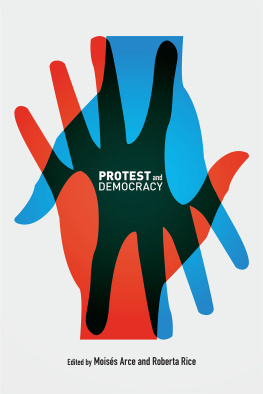Emmy Eklundh - Emotions, Protest, Democracy: Collective Identities in Contemporary Spain
Here you can read online Emmy Eklundh - Emotions, Protest, Democracy: Collective Identities in Contemporary Spain full text of the book (entire story) in english for free. Download pdf and epub, get meaning, cover and reviews about this ebook. City: Abingdon, year: 2019, publisher: Taylor and Francis, genre: Politics. Description of the work, (preface) as well as reviews are available. Best literature library LitArk.com created for fans of good reading and offers a wide selection of genres:
Romance novel
Science fiction
Adventure
Detective
Science
History
Home and family
Prose
Art
Politics
Computer
Non-fiction
Religion
Business
Children
Humor
Choose a favorite category and find really read worthwhile books. Enjoy immersion in the world of imagination, feel the emotions of the characters or learn something new for yourself, make an fascinating discovery.
- Book:Emotions, Protest, Democracy: Collective Identities in Contemporary Spain
- Author:
- Publisher:Taylor and Francis
- Genre:
- Year:2019
- City:Abingdon
- Rating:4 / 5
- Favourites:Add to favourites
- Your mark:
- 80
- 1
- 2
- 3
- 4
- 5
Emotions, Protest, Democracy: Collective Identities in Contemporary Spain: summary, description and annotation
We offer to read an annotation, description, summary or preface (depends on what the author of the book "Emotions, Protest, Democracy: Collective Identities in Contemporary Spain" wrote himself). If you haven't found the necessary information about the book — write in the comments, we will try to find it.
Emmy Eklundh: author's other books
Who wrote Emotions, Protest, Democracy: Collective Identities in Contemporary Spain? Find out the surname, the name of the author of the book and a list of all author's works by series.
Emotions, Protest, Democracy: Collective Identities in Contemporary Spain — read online for free the complete book (whole text) full work
Below is the text of the book, divided by pages. System saving the place of the last page read, allows you to conveniently read the book "Emotions, Protest, Democracy: Collective Identities in Contemporary Spain" online for free, without having to search again every time where you left off. Put a bookmark, and you can go to the page where you finished reading at any time.
Font size:
Interval:
Bookmark:
This is a significant new monograph, arguably the first of its kind, focusing on issues that are not only extremely topical like populism, but are also researched from innovative perspectives combining the discursive and the affective in a truly original way. This is a work of high academic standard, advancing innovative perspectives, and it promises to shape decisively on-going debates. Not to be missed!
Yannis Stavrakakis, Aristotle University of Thessaloniki, Greece
This necessary book develops a creative and original framework to conceptualize affects and emotions as essential elements to understand politics and democracy. Emmy Eklundh convincingly overcomes dichotomies such as rational and emotional, vertical and horizontal, as well as language and practices. Based on the cases of the indignados movement and Podemos, the book proves, empirically and theoretically, that emotions, far from being a risk belonging to the irrational masses, are the core of politics and the articulation of political subjects. Although grounded in the Spanish context, this book is highly recommendable to all those interested in democracy theory, social movements, new political parties, collective identities, political communication and discourse theory.
scar Garca Agustn, Aalborg University, Denmark
Emotions, Protest, Democracy: Collective Identities in Contemporary Spain is a significant and absolutely necessary contribution in the field of collective action, contemporary movements and democratic theory. Rather than searching for rationalist explanations, focusing either on the economic factors and/or the malfunctions of a democratic framework underpinned by the idea of rational consensus, the book moves further, exploring the role of affect in the constitution of political subjectivity. Contra contemporary academic and journalistic accounts afraid of engaging seriously with the role of emotions/affect in political life, this holistic ethnographic work on the Spanish Indignados, examines the processes of creating unity through disunity, disagreement and affect. The final chapter is itself a significant contribution in political theory.
Marina Prentoulis, Senior Lecturer in Politics and Media, University of East Anglia
Emotions, Protest, Democracy
With the rise of both populist parties and social movements in Europe, the role of emotions in politics has once again become key to political debates, and particularly in the Spanish case. Since 2011, the Spanish political landscape has been redrawn. What started as the Indignados movement has now transformed into the party Podemos, which claims to address important deficits in popular representation. By creating space for emotions, the movement and the party have made this a key feature of their political subjectivity. Emotions and affect, however, are often viewed as either purely instrumental to political goals or completely detached from real politics. This book argues that the hierarchy between the rational and the emotional works to sediment exclusionary practices in politics, deeming some forms of political expressions more worthy than others.
Using radical theories of democracy, Emmy Eklundh masterfully tackles this problem and constructs an analytical framework based on the concept of visceral ties, which sees emotions and affect as constitutive of any collective identity. She later demonstrates empirically, using both ethnographic method and social media analysis, how the movement Indignados is different from the political party Podemos with regards to emotions and affect, but that both are suffering from a broader devaluation of emotional expressions in political life.
Bridging social and political theory, Emotions, Protest, Democracy: Collective Identities in Contemporary Spain provides one of the few in-depth accounts of the transition from the movement Indignados to party Podemos, and the role of emotions in contemporary Spanish and European politics.
Emmy Eklundh is a Lecturer in Spanish and International Politics at Kings College London. Her research is mainly centred on the post-crisis eruptions of protest in Southern Europe and challenges to the European democratic order. Current research projects include the rise (or return) of left- and right-wing populist movements and parties in Europe.
Routledge Advances in Democratic Theory
Edited by Paulina Tambakaki (University of Westminster),
Lasse Thomassen (Queen Mary, University of London) and
David Chandler (University of Westminster)
Advisory Board: Amy Allen (Penn State University), Benjamin Barber (City University of New York), Rajeev Bhargava (Centre for the Study of Developing Societies), Fred Dallmayr (University of Notre Dame), John Keane (University of Sydney), James R. Martel (San Francisco State University), Chantal Mouffe (University of Westminster), Davide Panagia (UCLA), Bhikhu Parekh (House of Lords), and Nadia Urbinati (Columbia University)
Democracy is being re-thought almost everywhere today: with the widespread questioning of the rationalist assumptions of classical liberalism, and the implications this has for representational competition; with the Arab Spring, destabilizing many assumptions about the geographic spread of democracy; with the deficits of democracy apparent in the Euro-zone crisis, especially as it affects Greece and Italy; with democracy increasingly understand as a process of social empowerment and equalization, blurring the lines of division between formal and informal spheres; and with growing demands for democracy to be reformulated to include the needs of those currently marginalized or even to include the representation of non-human forms of life with whom we share our planet.
Routledge Advances in Democratic Theory publishes state of the art theoretical reflection on the problems and prospects of democratic theory when many of the traditional categories and concepts are being reworked and rethought in our globalized and complex times.
The series is published in cooperation with the Centre for the Study of Democracy, University of Westminster, London, UK.
6.Negativity and Democracy in the Critical Theory Tradition
Dialectics from Karl Marx to Open Marxism
Vasilis Grollios
7.Democratic Theory and the Enlarged Mentality
Stephen Acreman
8.Council Democracy
Towards a Democratic Socialist Politics
Edited by James Muldoon
9.Emotions, Protest, Democracy
Collective Identities in Contemporary Spain
Emmy Eklundh
For more information about this series, please visit: www.routledge.com/Routledge-Advances-in-Democratic-Theory/book-series/RADT

Emotions, Protest, Democracy
Collective Identities in Contemporary Spain
Emmy Eklundh

First published 2019
by Routledge
52 Vanderbilt Avenue, New York, NY 10017
and by Routledge
2 Park Square, Milton Park, Abingdon, Oxon OX14 4RN
Routledge is an imprint of the Taylor & Francis Group, an informa business
2019 Taylor & Francis
The right of Emmy Eklundh to be identified as author of this work has been asserted by her in accordance with sections 77 and 78 of the Copyright, Designs and Patents Act 1988.
All rights reserved. No part of this book may be reprinted or reproduced or utilised in any form or by any electronic, mechanical, or other means, now known or hereafter invented, including photocopying and recording, or in any information storage or retrieval system, without permission in writing from the publishers.
Font size:
Interval:
Bookmark:
Similar books «Emotions, Protest, Democracy: Collective Identities in Contemporary Spain»
Look at similar books to Emotions, Protest, Democracy: Collective Identities in Contemporary Spain. We have selected literature similar in name and meaning in the hope of providing readers with more options to find new, interesting, not yet read works.
Discussion, reviews of the book Emotions, Protest, Democracy: Collective Identities in Contemporary Spain and just readers' own opinions. Leave your comments, write what you think about the work, its meaning or the main characters. Specify what exactly you liked and what you didn't like, and why you think so.

